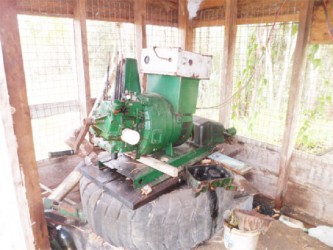Forty-five-year-old Patrenella Wilkie watched her daughter die from what started as a “mild fever” and she blames the lack of proper medical facilities available in the 72 Miles, Region Seven community for her death.
It has been years since her “big, big, good daughter” died and Wilkie is now saddled with the responsibility of taking of care her two children.
Wilkie and some other women from the community recently told the President of the Guyana Women Miners Organisation (GWMO) Simona Broomes during a visit that their community is the “forgotten village” and they pleaded for better health facilities and educational opportunities for the young.
Broomes visited 72 Miles and 14 Miles late last month and while she is concerned about what she saw in both areas it is for different reasons. While 72 Miles is in serious need of better social services, Broomes said she was very disturbed about the night life in 14 Miles, a setting that exudes prostitution and violence.
Health at 72 Miles
While Toshao Reynald Davis of 72 Miles indicated that the authorities are “trying” in the area of health, some of the ladies were of the view that much more needs to be done and that this could start with rehabilitating the building which serves as the health post since it is in a deplorable condition. They also complained that there is no form of employment in the community.
“The health is very poor,” Wilkie told Broomes in a recorded conversation adding that “when you guh for fever they don’t even have lil panadol or whatever to give you, and I don’t even like the health post itself how it deh.”
Other residents said that the building is rotting in some sections and it is not cleaned properly.
They told stories of a man who was bitten by a snake and a woman who was having an involuntary abortion and how they almost died because of the lack of health care and the length of time they had to wait for transportation to Bartica.
Another woman, who did not give her name, spoke about how she has to travel to Mahdia at her own expense to ensure her infant child attends clinic and is vaccinated, as the vaccines never come on time to the community’s health post.
However, Toshao Davis, whose comments were also recorded, said that the region’s health department has a schedule whereby they visit bi-monthly to administer vaccines, although he conceded that sometimes they do miss the dates through no fault of their own.
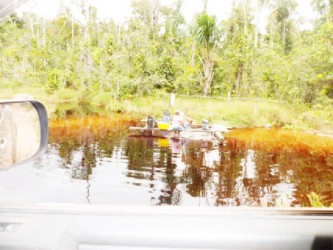
“But I see it as development, because previously we did not have that kind of service,” he said, recalling that when the late Desmond Hoyte was president he had given the community a generator to assist with the refrigeration of the vaccines, “but something went wrong and it went somewhere else.”
The generator they have right now has been condemned.
There is a health worker and midwife at present, so they do not have a problem administering vaccines; the issue is making them available.
However, he acknowledged that the lack of proper health care is a serious issue, because recently someone was sick and by the time the plane came the patient had died. He suggested there should be a permanent vehicle so in the event that someone becomes ill they can respond right away.
And children, including those of nursery age, according to the Toshao, have to walk long distances to get to school and it is hoped that they could be assisted with a vehicle in transporting them, while even parents could use it to go to clinic.
Residents believe that should the community be linked with the Cassandra crossing they would then be connected to Mahdia and life would be much easier.
Davis said at the last Toshao conference he had brought the issue up with President Donald Ramotar. “It is better for us in terms of business and all the social activities…” he said, adding that recently his fellow Toshao from Campbelltown visited and he raised it with her and she agreed to join forces in lobbying for the crossing.
He said if there is no money to work on it they will explore coming together and working on making the link with the bridge, since they see it as an advantage for the communities.
Broomes said the bridge would serve the community well, as people in Bartica could use it and bring in revenue for the community.
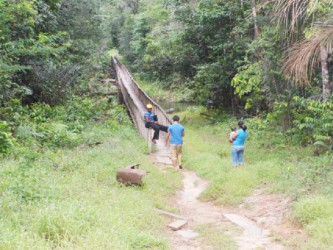
She said that most of the ladies she spoke to have some concerns about the health services provided and she explained that while the building which serves as the health post had been painted on the outside, on the inside it is rotting and there is no electricity or means of communication there.
“They said there was a radio set but it was stolen…” Broomes said, adding that she was informed that while one had been bought for the community a government minister had indicated that it had to be formally handed over to them. It has been eight months and they are still awaiting the visit by the minister to hand over the radio set which is believed to be lodged at the regional office.
“I think it is really sad to see how human beings and people are being treated. I am really saddened by it, the school is rotten from the walls outside… and it is well run down,” Broomes said.
Broomes said the organisation supported the community in a call for a better standard of living and she said since she was a member of the Special Land Use Committee (SLUC) set up by former President Bharrat Jagdeo following the protest by miners in Bartica, she had recommended that there should be a road linking 72 Miles to Mahdia.
“I had said and I would say it again, I think it is very deliberate that this road is not functional… I think it is sad to note that just a little piece of road about a mile…heading to the Cassandra crossing to take you into Mahdia, [can’t be constructed]” Broomes said.
Instead residents have to travel across the river, sometimes with their young children which is very unsafe.
According to Broomes these are some the issues that the parliamentarians on all sides should look “to rectify.”
‘A Sheriff Street by itself’
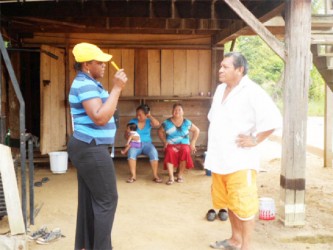
Meanwhile, Broomes said she is very concerned about what she observed while visiting another area called 14 Miles, and while not going into detail about some of the things she witnessed she said she would be making contact with the relevant authorities to raise her concerns.
She plans to dispatch letters to the Ministers of Human Services and Social Security and Natural Resources and the Environment, Jennifer Webster and Robert Persaud to bring them up to date on her visit and her observations.
“I have been hearing a lot of stories about 14 Miles, but I am always a person who like to be on the ground, and I went there to look around and observe,” Broomes said, adding that most of the murders from that area last year had to do with persons being intoxicated, and this alone tells a story.
Some of the complaints the GWMO received about the presence of underage girls in the area, prompted her visit, and she said she went in with a fact-finding mission in mind.
According to Broomes in earlier years she had worked in that area but the transformation she has seen during her recent visit is not one which is impacting positively on the residents.
“[Given] the amount of shops, I think prostitution is a big business there because that is what most of the businesses there at this time are focusing on, and because of that security is a key issue…
“It is a bright spot, it is a Sheriff Street by itself,” Broomes said, and that to her it is not a good thing for the community.
Another observation was that the area where most of the shops are located is leased to a community which is expected to start up a business in the near future, and Broomes said in discussion with the shop owners they admitted that they were aware of this and knew they will eventually have to move.
The GWMO president said she asked the shop owners why they invested so much money when they will eventually have to move but they figured in the end “everybody was just going with the fast money.”
During the visit she also held discussions with various persons on the Trafficking in Persons law, HIV/AIDS and other important issues, as it was obvious that prostitution is the main business in the community.
“My observation is not a nice one,” she said with a sad shake of the head.
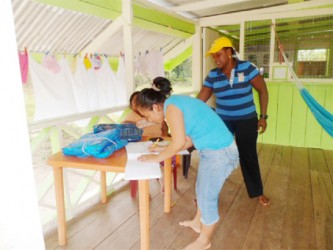
Broomes said she does not want to “go deep down into some of the key things now,” because she has plans to return with the relevant authorities since she wants the evidence to be produced. Often times, she explained, people accuse the organization of exaggerating what is happening in the mining areas.
“But what I can say is it was really surprising and the information we… received [is] all factual and is more than what I had expected.”
Broomes feels handicapped in that she cannot deal with situations as soon as she observes them and she said the GWMO plans to have better working relations with the Human Services Ministry and the Trafficking in Persons unit at the Ministry of Home Affairs.
Of concern to the GWMO, Broomes went on to say, is the fact that businesspersons are schooling women in what to say to officials when they are questioned. She said this is the feedback they have been receiving since they started their work a little over a year ago, and from talking to young girls they have found they would give their age but it would not correspond to the date of birth they would give later.
She gave the example of meeting a young woman on one of her visits to the interior and she said before she could ask the girl her age she indicated she had her identification card, but when she produced it the photograph was not hers. She quickly explained that it was her sister’s and she had picked it up by mistake.
Broomes said even if during visits there is no case of trafficking in persons the mere fact of sensitizing persons and giving residents numbers to call would indicate that the authorities are not “paralysed” adding that there were some young girls she would have liked to remove from 14 Miles but she could not do it on her own. She noted that had the girls appealed to her she would have put herself at risk to remove them.
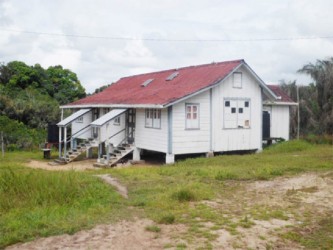
She said the GWMO wants to do more and they want to have the best image in the mining sector. The female cooks in the interior should dress properly, she said, as they “do not have to dress like a prostitute to be a cook, or not because you are in the mining sector you have to portray that whole language in itself on how you speak and portray yourself…”
During the visit the organsiation distributed treated nets to the villagers.
Broomes said the GWMO this year will make working with the Amerindian communities a priority and that many in the communities had taken the opportunity to join the organization.explained, people accuse the organization of exaggerating what is happening in the mining areas.
“But what I can say is it was really surprising and the information we… received [is] all factual and is more than what I had expected.”
Broomes feels handicapped in that she cannot deal with situations as soon as she observes them and she said the GWMO plans to have better working relations with the Human Services Ministry and the Trafficking in Persons unit at the Ministry of Home Affairs.
Of concern to the GWMO, Broomes went on to say, is the fact that businesspersons are schooling women in what to say to officials when they are questioned. She said this is the feedback they have been receiving since they started their work a little over a year ago, and from talking to young girls they have found they would give their age but it would not correspond to the date of birth they would give later.
She gave the example of meeting a young woman on one of her visits to the interior and she said before she could ask the girl her age she indicated she had her identification card, but when
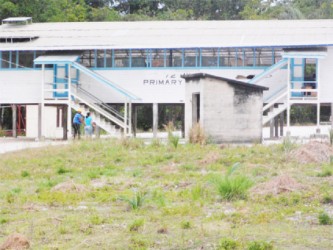
she produced it the photograph was not hers. She quickly explained that it was her sister’s and she had picked it up by mistake.
Broomes said even if during visits there is no case of trafficking in persons the mere fact of sensitizing persons and giving residents numbers to call would indicate that the authorities are not “paralysed” adding that there were some young girls she would have liked to remove from 14 Miles but she could not do it on her own. She noted that had the girls appealed to her she would have put herself at risk to remove them.
She said the GWMO wants to do more and they want to have the best image in the mining sector. The female cooks in the interior should dress properly, she said, as they “do not have to dress like a prostitute to be a cook, or not because you are in the mining sector you have to portray that whole language in itself on how you speak and portray yourself…”
During the visit the organsiation distributed treated nets to the villagers.
Broomes said the GWMO this year will make working with the Amerindian communities a priority and that many in the communities had taken the opportunity to join the organization.
